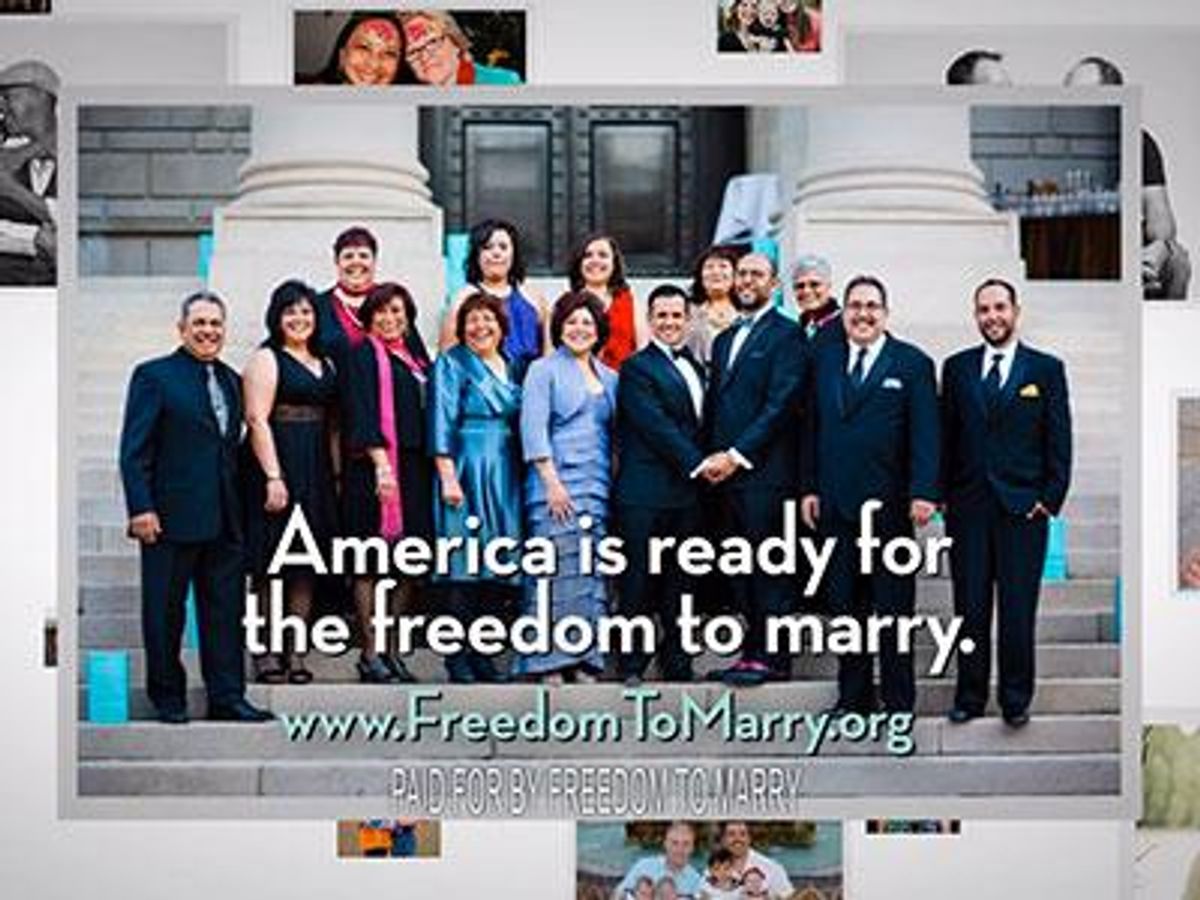Set to air one day before the Supreme Court meets for its first private conference of the new session, a national advocacy group has created an ad that argues that "it's time" for the high court to establish marriage equality nationwide.
The 30-second spot, produced by advocacy group Freedom to Marry, will first hit airwaves around Washington, D.C., during the Sunday morning talk shows, the group announced. Starting next week, the spot will be broadcast nationally on network television. Focusing on the critical legal protections denied couples in any of the 31 U.S. states without marriage equality, the ad highlights the dissonance between a society that claims to cherish independence and freedom but relegates many of its citizens to second-class status.
"One nation, indivisible -- except if you're gay," says a narrator in the ad. "In 19 states, gay couples and their children share in the protections that only the freedom to marry provides. In the others, they are banned from marrying. They're taxed unfairly, denied Social Security and parenting rights, and can lose a family home when their loved one dies. Every day of denial means real harms to real families. It's time to end marriage discrimination."
In a statement released with the video, Evan Wolfson, the founder and executive director of Freedom to Marry, said, "The ad underscores the human costs of prolonging marriage discrimination. Every day of denial is a day of real and needless injury, indignity, and injustice for too many families across the country -- and time matters. America is ready for the freedom to marry, 40 lower court rulings have affirmed the freedom to marry, even opponents are saying it's time to bring the country to national resolution -- and it is, indeed, time."
Watch the ad here:
When the nine justices of the U.S. Supreme Court hold their first private conference of this session on Monday, they will have the opportunity to consider reviewing seven marriage equality cases from five states. While the court is under no obligation to take up any of the cases -- at this conference or any other -- advocates on both sides of the issue widely expect the court to consider at least one of the cases in the coming year or two.
It is possible that the court could decline to take up any of the cases currently before it, which would have the effect of affirming the so-far-unanimous decisions of lower courts finding statewide bans on same-sex marriage unconstitutional. If that's the course taken by the court, marriage equality could be on its way to an estimated 65 million Americans who reside in the states with cases before the court, and those states covered under the jurisdiction of circuit courts of appeal.
While it is impossible to predict the actions that might be taken by the Supreme Court, Justice Ruth Bader Ginsburg recently made headlines for her assessment that "there is no need for us to rush" to issue a definitive ruling, pointing the nearly unanimous decisions by lower courts finding marriage bans unconstitutional.
However, with more than 80 cases challenging statewide marriage bans in every U.S. state and territory without marriage equality, it's entirely possible that federal courts will eventually disagree with one another on the issue. In fact, earlier this month, a federal district judge in Louisiana bucked the national trend and upheld the state's ban on same-sex marriage, claiming it was rationally related to the state's "legitimate interest" in "linking children to an intact family formed by their two biological parents.
Less than a month earlier, a state judge in Tennessee arrived at a similar conclusion, and upheld that state's constitutional ban on same-sex marriage. Both of those decisions are expected to be appealed.



















































































